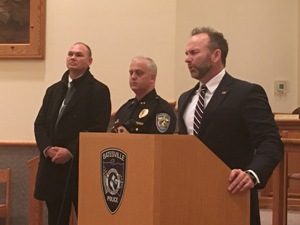
Versailles, In. — 0ver my 20 years, the following question has been posed to me and other dedicated domestic violence prosecutors throughout the country. If the victim doesn’t want a prosecution of her perpetrator for domestic violence, then why does the State, by a prosecutor, insist on moving forward? The jurors sometimes wonder. Some past and present judges have asked. Even police officers and some prosecutors have wondered the same thing. Is it a simple answer? While the law and its application is sometimes perceived as black/white, it really isn’t. Victims often still love their perpetrators. Victims married to their perpetrators didn’t envision this as they accepted a wedding band after a marriage proposal or as they left for their honeymoon. Many often have children with their perpetrator. How can they testify against the father of their children and support a ‘no contact’ order keeping the children away from their father? Many victims cannot support themselves and depend on the income of their perpetrator. How are they supposed to make a mortgage payment if he’s in jail and not working? These questions and dilemmas are confronted every day in the largest metropolitan areas and most rural of communities scattered about this country. These are questions that need to be answered, sometimes in seconds, in a courtroom.
Back to the question…if she doesn’t care why should I? Why should you? If she won’t cooperate then why not walk away? Sometimes people can’t fight for themselves. Sometimes people won’t. Be cautious about judging. Sometimes people need to know someone believes in them. At times, that’s not easy. But when you do and they know it, there begins a culture of trust. Maybe they won’t cooperate in a prosecution this time, and maybe there’s not enough evidence to prosecute without them. But maybe she will cooperate if there’s ever a next time.
Does the prosecutor have a larger and greater duty to protect the community even though the victim doesn’t want to assist in the prosecution? Yes, but her safety must be balanced too. Is there a duty to justice and the oath that a prosecutor took when he/she was sworn into office? Yes, if there was a crime committed and probable cause exists, but again, the victim’s safety must be a factor. These are difficult questions.
October is Domestic Violence Awareness Month. As a veteran prosecutor, President of the Association of Indiana Prosecuting Attorneys, and a nationwide trainer on domestic violence, I challenge the community, state and country to take a closer look at not just what domestic violence is on its surface but deeper, and try to understand it’s apparent counterintuitive nature. And, keep in mind those allied professionals who pick up the sword every day to protect those who can’t or won’t protect themselves.
Ric Hertel
Ripley County Prosecuting Attorney



